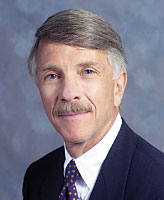Not long ago I received an unsolicited e-mail promoting a new book. The author of this work holds a doctorate in "transpersonal psychology" and the book describes the author's work with "transmundo beings," described as "nonearth entities that arise in regression therapy."
Well, OK, I think most of us would agree that this particular "therapy" is pretty far out and is unlikely to show up in published research on evidence-based psychotherapies. But coincidentally, a few days later, a colleague at the Menninger Clinic gave me a few printouts from Web sites offering online counseling or "chats," and these samples barely skimmed the surface of the pages and pages that a Google search serves up about this fast growing industry.
For example, one company offers "private online chats" (by appointment, through an online appointment system, $95 for one 60-minute chat, $888 for 10 one-hour chats, paid through Paypal), or "therapy sessions" (response guaranteed within two days, $39.95 for one e-mail session, $349 for 10 e-mail sessions, paid through Paypal). Therapists' photos, credentials, and profiles are provided, and all online therapists are billed as "licensed or board certified in their states, have at least 10 years' experience, and are carefully selected. . . ."
Another example: a self-described "premier online therapy service" advertises that one can "get live help for depression, stress, relationship issues, mental health issues" for clients who "live in rural areas, are homebound, will not go to therapy in person, want convenient, discreet access." Therapists are "licensed counselors" and "e-mmediate care" is provided. When I accessed this site, however, the "e-mmediate care" page said, "All therapists are currently with clients. Please try again."
And yet one more example: "Get professional online counseling advice now." Photos of the therapists are shown, along with profiles. Rates are shown as well, usually $3 a minute (except for one pricey guy who charges $3.25 a minute).
You get the picture. Yet while this may sound outlandish, if you think about it, it's not really new. Doctors and clinicians charge for services rendered, or by the hour. It's just that once we're on the Web or using other new media, it feels (and is) unregulated. There are more and more "celebrity" therapists whose faces become familiar on network or cable shows, where the temptation to slide close to or over the ethical edge is very real. Diagnose a famous person based on secondhand information or hearsay. Give a sound-bite opinion that may sound wise but may be misunderstood by or even harmful to those who are desperate. I recently came across the Web site of a well-trained, credentialed psychiatrist who offers "street therapy," with video samples of his curbside consultations to strangers on city streets, cameras rolling.
In a recent TIME Healthland blog, Alan Kazdin responded to questions in a posting with the unfortunate title "Q&A: A Yale Psychologist Calls for the End of Individual Psychotherapy." I found the title puzzling and misleading, since Kazdin acknowledged, in a thoughtful article referred to in the blog, that there is strong evidence of the effectiveness of psychotherapy to treat many psychiatric conditions. Kazdin's concern was that the percentage of people who really need this treatment and actually receive it is extremely low. He urged us to develop new and different ways to provide treatment to reach more people, and I agree. The challenge is substantial, however, and he says that "the poor public has no chance. You go to the bookstore or look online, and 99 percent of what you get is someone winging it." It's hard to argue with most of that.
Psychiatrists and behavioral health clinicians have been studying the effectiveness of psychotherapy for years. Published randomized, controlled trials are piling up demonstrating the effectiveness of many types of therapy, from cognitive to behavioral to psychodynamic and more, for conditions ranging from mood and anxiety disorders to personality disorders. Yet far at the other end of the spectrum, often under the same heading of "therapy," untested strategies are proliferating. While some of these offerings may help some who are suffering, others may be frankly ineffective, unethical, or the psychological equivalent of snake oil.
What to do? The world is changing very fast, and the Internet is a main engine of change. The development of Web-based therapy was inevitable, and new video-link technology makes "face-to-face" treatment available to remote areas where in-person resources are scarce. APA endorses in-person, face-to-face psychotherapy as an evidence-based, effective treatment for many conditions, spelled out in detail in our practice guidelines. But we need to get on board with the technology of tomorrow, taking an active role to harness its potential, so that more people who need help can get valid, legitimate help in new and nontraditional ways.
One organization doing just that is the American Association for Technology in Psychiatry, in which many APA members are part of a team dedicated to promoting "the use of information technology to improve the quality and availability of psychiatry and mental health care." In addition to establishing a new ECP/MIT Work Group on New Technology, which will focus on improving communication within APA, I am putting the topic of "e-therapy" on the agenda for discussion at the Board of Trustees meeting.
Meantime, while we're exploring new horizons, let's keep teaching each other about the psychotherapy of today. One great opportunity to do just that is already confirmed for our annual meeting in Philadelphia in May 2012. At the Opening Session on Sunday, May 6, a special presentation is planned titled "Cognitive Therapy and Psychodynamic Therapy: More Alike Than Different? A Conversation Between Aaron Beck and Glen Gabbard." I'll be moderating this session, and I'm delighted to be able to share the stage with these uncontested leaders in the world of psychotherapy. Mark your calendars!



